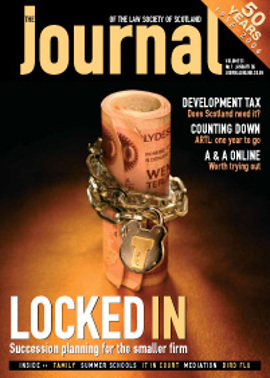First duty to the court

Designation of a party
This issue arises in Accountant in Bankruptcy v Butler 2005 GWD 36-674. Decree for payment and subsequent sequestration had been awarded against a concern HB Engineering. The defender in the present action, which was for declarator that HB Engineering and the defender were one and the same legally, was the sole proprietor and accordingly the true defender in the original decree for payment. The pursuer then sought declarator that the estates of Mr Butler had been sequestrated. Sheriff Ireland allowed the action to survive the debate on the basis that the defender admitted that he and HB Engineering were one and the same person. The defender had, inter alia, argued that whilst a person carrying on business under a trading or descriptive name could be sued in that name and any decree granted was a valid warrant for diligence against such a person, sequestration was not a diligence. Accordingly it was beyond the scope of ordinary cause rule 5.7. Further, any errors in the name of a party in a sequestration might be fatal to the sequestration. The award of sequestration had been granted against a non-existent person. The decision highlights the problems which can arise when decree is granted against a business name as opposed to the proprietor or partners trading under the particular trading name. It seems to me that the present action could have been avoided if the holders of the decree for payment had served a charge against Mr Butler and then applied for his sequestration of the basis of the expired charge.Decree by default
The decision of Lord Macfadyen delivering the opinion of the Inner House in McDonald v Stirling Council, 18 November 2005 stresses the significance of the strengths or otherwise of a party’s case when a motion for decree by default is made. Decree of dismissal had been granted as a result of the pursuer failing to appear at a diet of debate. He appealed. It was accepted that in all probability he had a reasonable excuse for his non-appearance. However, the pursuer did not have an arguable case and accordingly his appeal was refused.Advocate’s responsibilities
In Harrison’s Executor v Student Loans Co, 12 October 2005 Lord Hardie made certain observations as to the responsibilities of an advocate. The evidence of the pursuer had been taken on commission prior to the proof. The defenders’ agents provided a full transcript of the evidence to their principal witness. They further provided a copy of a section of the evidence from another witness. The purpose was to give the principal witness background briefing. It was argued that as this witness was the chairman of the defenders, he was in effect the client. If he had been the client he would have been entitled to sit in during the evidence of these witnesses. Lord Hardie indicated that whilst the precognition and re-precognition of witnesseswas perfectly legitimate in the light of any developments in a litigation, coaching or briefing a witness was not. Any actions on the part of a solicitor, which might cause a witness to give different evidence from that which he would have originally given, were unacceptable. His Lordship further observed that those who represented parties in court as advocates, and this applies equally to solicitors appearing in court, required to recognise that their primary duty was to the court. There is the potential for that to be lost sight of if the relationship between the advocate and the party or instructing solicitor is too close. In the case in question the instructing solicitor was a partner of the solicitor advocate appearing.
Making interdict perpetual
The decision of Sheriff Ireland in Haggarty v Woodrow 2005 GWD 35-645 stresses that particular considerations apply when considering whether to grant a perpetual interdict. In granting a perpetual non-molestation interdict, it was accepted that since the granting of an interim interdict, there had been a couple of incidents, first when the defender approached the pursuer at the parties’ child’s school and, secondly, when the defender assaulted the pursuer’s partner. Sheriff Ireland concluded that looking at the defender’s behaviour, both prior to and after the granting of the interim interdict, it was clear that he had a quick temper and on occasions was violent. His behaviour could be described as abusive when the whole pattern of behaviour was looked at. Although there had been no significant breaches of the interim interdict apart from the school incident and the instance of assault, these incidents indicated that the defender had difficulty obeying court orders. Accordingly the pursuer was entitled to be reasonably apprehensive that but for an interdict, the defender would continue to act in such a manner. A further useful decision dealing with the issue of the granting of decrees in absence for perpetual interdicts is that of Sheriff Mitchell in Bailey v Bailey 1987 SCLR 1.
Jurisdiction in family actions
In Carroll v Carroll, Airdrie Sheriff Court, 27 October 2005, the pursuer raised an action in relation to the parties’ son. The pursuer founded jurisdiction on the terms of section 12 of the Family Law Act 1986, the child being present in Scotland and it being necessary that an order for the protection of the child be granted immediately. The child was habitually resident in England. Proceedings had been instituted in Leicester County Court inter alia relating to the child. These proceedings had been ongoing for some time. Various orders had been made relating to the child in England, including an order prohibiting the pursuer removing the child to Scotland. The orders of the county court had been registered in the Court of Session. The sheriff had appointed a solicitor to investigate matters relating to the child prior to deciding any issue of a residence order. Sheriff Principal McInnes decided that there was no jurisdiction in Airdrie Sheriff Court. There was no basis for concluding that an order was necessary for the protection of the child. Indeed, by calling for a report in respect of the child, it was clear that the sheriff did not consider that an immediate order was necessary.
Purpose of witness’s report
A technical issue relating to expenses arose in Ewos Ltd v Mainland 2005 GWD 38-713. In the course of his decision Lord Drummond Young noted that when expenses are awarded, two interlocutors are in effect made. The first deals with the award and who is liable to meet the award, the second is the decerniture of the expenses so awarded, normally with a direction to the Auditor of Court to tax the account of expenses lodged. The decerniture determines that part or the whole of the litigation and can be extracted. It is accordingly unable to be altered. This was of significance in the issue before Lord Drummond Young in which the defender sought to alter certain interlocutors insofar as relating to the basis of taxation of the expenses. A further interesting issue arose in Barrett v Thompsons 2005 GWD 37-691. A note of objections was taken to the taxing off of fees for an expert witness instructed by the pursuer. This witness had prepared a report available whilst the parties were amending. The report was used as the basis for some averments added during that procedure. On that basis, the fee was taxed off, the pursuer having instituted the amendment procedure. Lord Macphail allowed the note of objections. The witness was certified as an expert. Accordingly this implied that he had carried out investigations in order to qualify himself to give evidence. The report accordingly was not part of the amendment procedure.
The usual caveat applies. Belated best wishes to all in 2006.
Postscript
Since the last article Nimmo v Bank of Scotland has been reported at 2005 SLT (Sh Ct) 133 and Paterson v Paterson at 2005 SLT (Sh Ct) 148. Both were discussed in the November article.
In this issue
- Pressing ahead
- Regulation, 2006 style
- Held to ransom?
- A world turned upside down
- Quiet revolutions
- For supplement read tax
- Why mediation is a bad idea, and other myths
- Advice in a Europe of many notions
- At the touch of a button
- What sort of courts do we want? (And when?)
- KM in practice
- If the bug bites
- Refreshing risk quiz
- The partnership must go on
- First duty to the court
- A difficult birth
- Nuclear power no thanks?
- Due diligence
- Will less mean better?
- Scottish Solicitors' Discipline Tribunal
- Website reviews
- Book reviews
- Back to the future
- Users' IT requirements for ARTL






